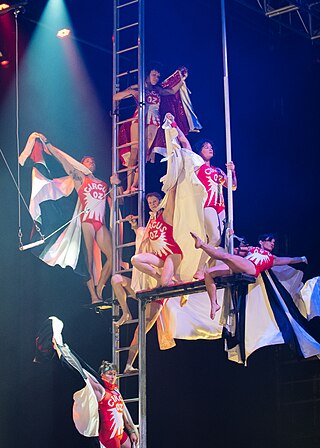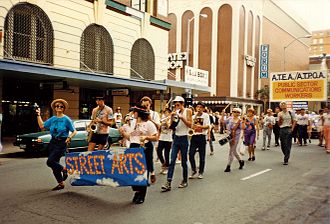
Circus Oz is a contemporary circus company based in Australia, collectively owned by its Membership, founded in 1977. Its shows incorporate theatre, satire, rock 'n' roll and a uniquely Australian humour.

Inala is a south-western suburb in the City of Brisbane, Queensland, Australia. In the 2021 census, Inala had a population of 15,273 people.
Murri is a demonym for Aboriginal Australians of modern-day Queensland and north-western New South Wales. For some people and organisations, the use of Indigenous language regional terms is an expression of pride in their heritage. The term includes many ethno-linguistic groups within the area, such as the Kamilaroi (Gamilaraay) and Yuggera (Jagera) peoples.

The Queensland Cultural Centre is a heritage-listed cultural center on Grey Street, South Brisbane, Queensland, Australia. It is part of the South Bank precinct on the Brisbane River and was built from 1976.
Queensland Theatre, formerly the Queensland Theatre Company and Royal Queensland Theatre Company, is a professional theatre company based in Brisbane, Australia. It regularly performs in its own Bille Browne Theatre and the Queensland Performing Arts Centre's Playhouse.

The culture of Brisbane derives from Australian culture and incorporates a strong history in the performing arts, music and sport.

Theatre of Australia refers to the history of the live performing arts in Australia: performed, written or produced by Australians.
Alan Edmund William Edwards was a British actor and founding artistic director of the Queensland Theatre Company in Brisbane, Queensland, Australia.
Lionel Fogarty, also published as Lionel Lacey, is an Indigenous Australian poet and political activist.

Richlands is an outer south-western suburb in the City of Brisbane, Queensland, Australia. In the 2021 census, Richlands had a population of 5,621 people.
Vulcana Circus is an Australian circus, created with the aim of training women, trans women, and non binary adults, and children and teens of all genders in the circus arts. The company was founded in 1995 at West End in Brisbane, by Antonella Casella in Brisbane, Australia, the company was named after the famous British strongwoman Vulcana.

The Flying Fruit Fly Circus is Australia's national youth circus, and the only full-time circus school for young people in Australia.
Anywhere Festival is an annual Brisbane based festival for performance anywhere but traditional theatre spaces. The first anywhere-but-in-a-traditional-theatre concept was brought to Brisbane in 2011 by creative director Paul Osuch and his partner, Ally McTavish. Their theory is that we need to take traditional story-telling out of theatre buildings and back to where life really takes place, in the community.
La Boite Theatre, founded as the Brisbane Repertory Theatre Society, is an Australian theatre company based in Brisbane, Queensland. La Boite was established in 1925 and is Australia’s longest continuously running theatre company.
The Popular Theatre Troupe was an agitprop ensemble formed in Brisbane, Queensland in 1974 as part of a radical movement against Premier Joh Bjelke-Petersen's conservative Queensland's government of the day. The troupe toured Australia with a total of 25 original shows between 1974 and 1983. The key players in the ensemble organised ten large community events and were behind many community arts projects.
The Pram Factory was an Australian alternative theatre venue in the Melbourne suburb of Carlton from around 1970 until 1981. It was home to the Australian Performing Group and Nindethana, Australia's first Aboriginal theatre group.

Circa Contemporary Circus is an Australian contemporary circus company. Based in Brisbane, Australia, Circa produces circus productions drawing on acrobatics, movement, dance, music and theatre that tour in Australia and internationally. The company was established in 1987 and was initially named Rock n' Roll Circus. It was an ensemble based contemporary circus company that focus on performing the voice of the people during a politically turbulent time in Queensland, Australia, during the Joh Bjelke-Petersen era before shifting to a director led company and was renamed 'Circa' in 2004 under the direction of Yaron Lifschitz.
Jason Klarwein is an Australian actor, director, producer and artistic director, known for his involvement with Grin & Tonic theatre troupe.

Yvette Henry Holt is a contemporary Australian poet, essayist, academic, researcher and editor, she heralds from the Bidjara, Yiman and Wakaman nations of Queensland. The youngest child born to prominent Queensland Elder, Albert Holt and Marlene Holt. Holt came to prominence with her first multi-award-winning collection of poetry, Anonymous Premonition, published by the University of Queensland Press in 2008. Since 2009-2021 Holt has lived and worked in Central Australia among the Central and Western Arrernte peoples of Hermansburg and Alice Springs.
Roxanne McDonald is an Indigenous Australian actress based in Queensland.









